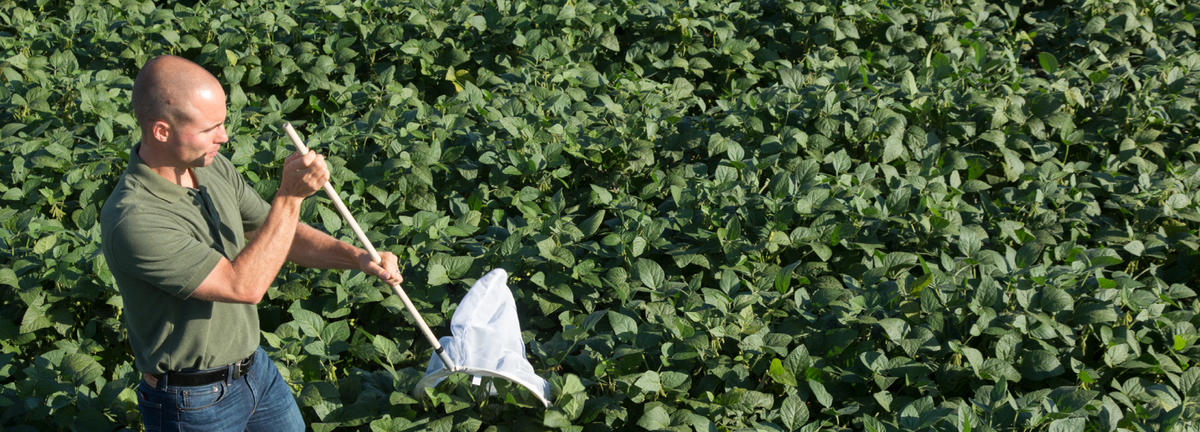
Researcher Robert Koch collects samples from a soybean field
Background
The soybean aphid (Aphis glycines) is the most significant insect pest of soybean production, especially in Minnesota. Soybean farmers currently protect against soybean aphids with insecticides, which threaten the economic and environmental sustainability of soybean production.
This research aims to serve Minnesota's agricultural community by advancing the development of aphid-resistant soybean cultivars, and improving remote sensing technologies (drones) to locate damaging levels of soybean aphids.
As a result, there could be a significant decrease in the use of insecticides. This will reduce economic and environmental impacts of soybean aphid management.
Project phases
Project information
Research project title: Decreasing environmental impacts of soybean aphid management
Taxa: Invertebrate
Species: Soybean aphid (Aphis glycines)
Project status: Completed in 2021
Funding: $570,000
Research questions
- Can we develop aphid-resistant soybean varieties that are adapted to Minnesota growing conditions?
- How can we use UAV’s to estimate where and how abundant soybean aphids are in a field?
Project information
Research project title: Confronting soybean aphid with advanced plant breeding and remote sensing
Taxa: Invertebrate
Species: Soybean aphid (Aphis glycines)
Project status: Completed in 2023
Funding: $570,000
Research questions
- How can we expand the diversity of aphid-resistant cultivars available to growers?
- How can we advance remote sensing for soybean aphid?
Outcomes
Over the course of both project phases, Koch’s team successfully developed multiple aphid-resistant varieties. They advanced the breeding pipeline, increasing the number of lines with multiple aphid resistance genes. Overall this will result in more effective aphid control.
The team also advanced the ability to use remote sensing (drones) to detect soybean aphid. They built hardware to host new algorithms for autopilots, and they were able to build a model to use actual satellite data to accurately determine if aphid infestations in soybean fields are great enough to require insecticides to protect yield.
The project also led to the detection of a new soybean pest, Macrosaccus morrisella.
Outcomes from this project help farmers prevent soybean aphid outbreaks through the use of aphid-resistant soybean lines. It also enables effective remote scouting for aphid infestations, which could significantly decrease the unnecessary use of insecticides.
Publications
- Economic-threshold-based classification of soybean aphid, Aphis glycines, infestations in commercial soybean fields using Sentinel-2 satellite data (Crop Protection, 2023) - authors' manuscript available to read for free
- Effects of feeding injury from Popillia japonica (Coleoptera: Scarabaeidae) on soybean spectral reflectance and yield (Frontiers in Insect Science, 2022)
- Evaluation of Advanced Soybean Breeding Lines for Resistance to the Soybean Aphid (Arthropod Management Tests, 2022)
- Air data fault detection and isolation for small UAS using integrity monitoring framework (Navigation, 2021)
- First Reports of Macrosaccus morrisella (Lepidoptera: Gracillariidae) Feeding on Soybean, Glycine max (Fabales: Fabaceae) (Journal of Integrated Pest Management, 2021)
- Variation in Soybean Aphid (Hemiptera: Aphididae) Biotypes Within Fields (Journal of Economic Entomology, 2021)
- Two-Stage Batch Algorithm for Nonlinear Static Parameter Estimation (Journal of Guidance, Control, and Dynamics, 2020)
- Detection of stress induced by soybean aphid (Hemiptera: Aphididae) using multispectral imagery from unmanned aerial vehicles. (Journal of Economic Entomology, 2019
- Observability and Performance Analysis of a Model-Free Synthetic Air Data Estimator (Journal of Aircraft, 2019)
- Genome-wide association mapping of host-plant resistance to soybean aphid (The Plant Genome, 2018)
Outreach
- International Conference on Precision Agriculture, 2022
- Meeting of the Entomological Society of America, 2021, 2022
- Upper Midwest Invasive Species Conference, 2022
- North Central Branch of the Entomological Society of America, 2022
- Minnesota Ag Expo, 2022
- Prairie Grains Conference, 2021
News and media
- Using artificial intelligence and satellites, U of M helps farmers detect aphid infestations (WCCO CBS News, 2024)
- Satellites and AI could help farmers detect soybean aphid infestations (MITPPC, 2024)
- U of M researchers work towards sustainable, pest-resistant soybeans (MITPPC, 2023)
- Soybean Solutions with Dr. Koch (FarmBits podcast episode, Nebraska Extension Digital Agriculture, 2023)
- Aphid-resistant soybean varieties for Minnesota (UMN Extension)
- Building Resistance: The Road to Aphid-Resistant Soybean Varieties in Minnesota (Minnesota Invasive Terrestrial Plants and Pests Center)
- 5 Ways Researchers Are Using Drones to Stop Invasive Species (Minnesota Invasive Terrestrial Plants and Pests Center)
- Soy natural: Genetic resistance against aphids (High Plains Journal, 2018)
- Gathering Soybean Data (video, MN Soybean Research & Promotion Council, 2020)
- Meet the Researcher: Aaron Lorenz